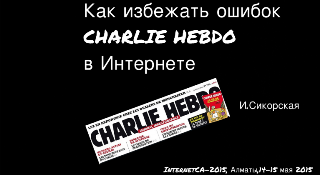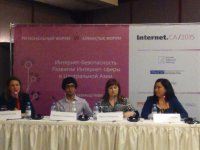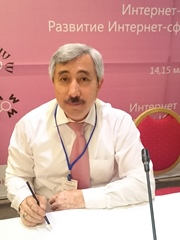19-05-2015, 17:48 Category: English, Education & Trainings, New Media Tools & Training Materials, Reports & Researches, Trends, News
 Reports and master
classes about it topics were presented at the Internet Forum by I. Sikorskaya
and V.Mamedov, expertsof the School
of Peacemaking and Media Technologies. Experts believe that new tools of
linguistic, speech, digital security and visual hygiene will help journalists,
rights activists and users improve their network communications in the digital
age.
Reports and master
classes about it topics were presented at the Internet Forum by I. Sikorskaya
and V.Mamedov, expertsof the School
of Peacemaking and Media Technologies. Experts believe that new tools of
linguistic, speech, digital security and visual hygiene will help journalists,
rights activists and users improve their network communications in the digital
age.
The study and master classes on linguistic, speech, digital security and visual hygiene were provided byat the 6thannual international forumDevelopment of Internet Sphere in Central Asia InternetCA-2015, which was held May 14-15 in Almaty (Kazakhstan).At the forum were also participated experts from Kazakhstan, Germany, Russia, Ukraine, Bulgaria and the OSCE.
The advanced course presented by Peacemakingschool’s experts goes beyond all existing methodologies since it offers the complex approach: from knowledge-based tools to technological skills and development of new network thinking in the digital age.
Inga Sikorskaya, Director of the School of Peacemaking, delivered a speech on How to avoid the mistakes of Charlie Hebdo on the Internet, which contained results and recommendations made on the basis of constant researches related to the study of hate speech in media and online, linguistic, speech security, visual hygiene.
These are new trends in digital security techniques, which await implementation into the existing practices of combatting the cyber threats and other challenges on the Internet. Kyrgyzstan has enough studies and developments for wider implementation of these cases into training programs for journalists, rights activists, users in Central Asia and other countries.
After the terror attack on the reporters of the Paris-based Charlie Hebdo satirical magazine this January, preceded by the publication and distribution of controversial Muhammad cartoons in the magazine and over internet, local and foreign experts ofSchool of Peacemaking and Media Technologyarranged a series of panel discussions related to this tragic trend.

"We have drawn a parallel between the internet situation in Kyrgyzstan and CA region, which contains enough hate speech and satire, which often have no clear distinction between them,” Inga Sikorskaya spoke at the forum. "So we have arrived at a conclusion that existing scopes of hate speech can also lead to direct violence, just like with Charlie Hebdo.”
The challenges of recent
years, including those on the Internet, demonstrate that the situations change drastically
and it’s better for users to develop certain standards and understanding of
which post or article is appropriate for the publication and is safe for
distribution over the network.
The speaker emphasized four points, which are currently posing a threat to the linguistic and speech security on the internet. These are existing stereotypes among users, propaganda, intolerance and cyber bulling. The consequences of cyberwarfare may be bad both for post authors and for the audience: varying from attacks and threats of online, legal and justified charges of users to direct violence.
Inga Sikorskaya provided cases on linguistic security and visual hygiene to the forum participants, and also main tools, which can make users safe on the network and overcome hostility in public discourse. These are techniques of "slow posting”; self-test with the 5-score test, components of comprehensive and functional analysis of media texts.
 V. Mamedov, expert in combatting internet threats, presented the analysis of internet security in
Central Asian states. He pointed out significant risks that make the
worldwide web vulnerable to both hacking and various controlling structures.
V. Mamedov, expert in combatting internet threats, presented the analysis of internet security in
Central Asian states. He pointed out significant risks that make the
worldwide web vulnerable to both hacking and various controlling structures.
First, this is the lack of Windows-based operating systems and ongoing practice of usage of their pirated copies and various applications, including applications protecting from web threats. According to expert data, pirated versions of Windows have been installed on approximately 70% of PCs of non-commercial organizations of Central Asia.
"These pirated versions usually contain various types of spyware that increase the risks of important data theft,” Mamedov emphasized. "Their wide spread occurrence is caused by poor financial means of NGOs due to high cost of original distributives. This is especially true for the countries with poor grant support of non-commercial sector – Uzbekistan and Turkmenistan.”
Second, this is a bad security assessment of used email servers and social networks, as well as the lack of special policy in this field in organizations, media and individual users.
Experts think it is important to widely introduce educational programs on digital, linguistic, speech security, training of users in individual risk assessment and development of individual card of secure stay on the internet.
A series of master classes and workshops by experts of School of Peacemaking and Media Technology, already launched in Kyrgyzstan and Kazakhstan as part of training components "Media Literacy in the Digital Age” and "Security of Network Communications in the Digital Age”, will help mitigate the risks faced by Central Asian users.
Nuria Lamberg,
regional trainee of School of Peacemaking and Media Technology in CA

The School of Peacemaking and Media Technology in Central Asia announces an annual competition among students from Kyrgyzstan, Kazakhstan,…

25 journalists and media workers from various regions of Kyrgyzstan have been trained to counter the propaganda of violent extremism and hate in…